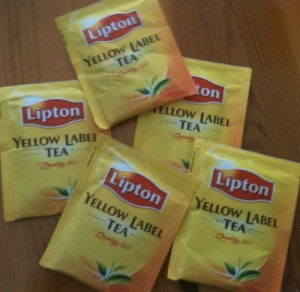 A little lesson from Lipton’s Tea and a good CRM joke
A little lesson from Lipton’s Tea and a good CRM joke
Many years ago David Bernstein, a big name in advertising for many years rang me uop cto ask if I would write a piece on CRM for the Unilever house magazine.
After some vulgar discussion about money I took the precaution of asking what he meant by CRM.
Marketers, ever on the look-out for shiny new things that will remove the need to think fell in love in a big way with Customer Relationship Management – CRM.
This fairly bogus theory is based on the idea that customers and prospects would want could to hear about the same things at certain stated intervals and so you could computerise everything.
Before you all howl and say I am grossly oversimplifying, I admit it. I am. But however elaborate or well-devised a CRM scheme may be it often falls down because the computer cannot write your copy for you – and most CRM copy is dire.
It also falls down because before anything else you have to be nice to your customers,  something many firms find very hard. You only have to reflect on your experiences with whatever firm rips you off ofor your mobile, or almost any bank or insurance firm to know that.
something many firms find very hard. You only have to reflect on your experiences with whatever firm rips you off ofor your mobile, or almost any bank or insurance firm to know that.
Anyhow, there are CRMs undreamt of by marketers. Credit Risk Management, for instance. And David wanted me to write about Cause Related Marketing, which I did. I learned that other things being equal 82% will choose a product which is linked to a good cause.
This made me wonder about the other 18%. Were they just miserable bastards? Or were they too stupid to understand the question? I mean, why wouldn’t you help a good cause if you lost nothing by it?
No, the other 18% are not necessarily miserable or heartless bastards.
Charities, no matter how good the causes they set out to crusade for may be, are just as good at upsetting their target market as the banks, insurance and cell phone companies you mention.
I had the personal experience in Zimbabwe, of being intimidated and threatened with death by political thugs in a pickup truck emblazoned with the name and slogans of a very publicly active and huge international charity.
Even accepting that the truck may have been misappropriated, the fact that the charity continued to work with that government and refused to listen to my account of the incident left me with the determination never to support that charity again.
Charities that use under 50% of their revenue for good causes while paying their chief executives astronomical salaries do not get my support either.
I’m amazed by how few people actually check out charities before supporting them. Many popular charities are exceptionally irresponsible with donor money.
I agree with what you say about charities. I recall with anger talking to a charity executive taking the same plane as me who was working in Rwanda. He was travelling business class; I was travelling economy. Donors had paid for his ticket.
In the case I cite, the question asked was simple: if you have the choice between two identical products one of which supported a charity and the other didn’t, which would you buy?
I think the normal response would be the one that helped the charit.y